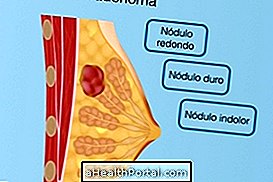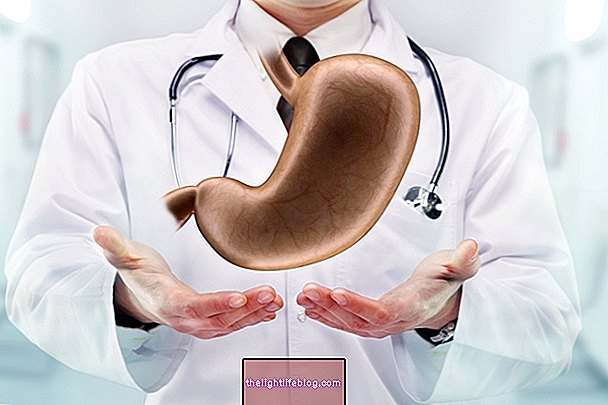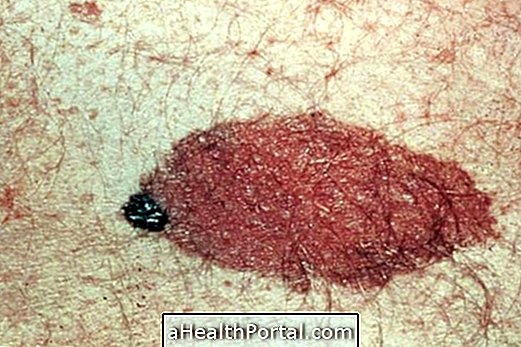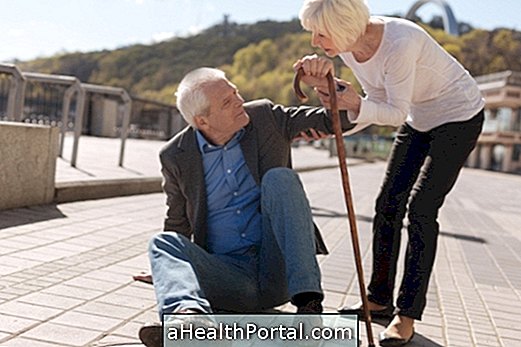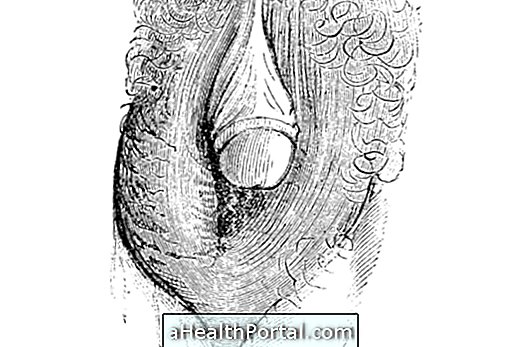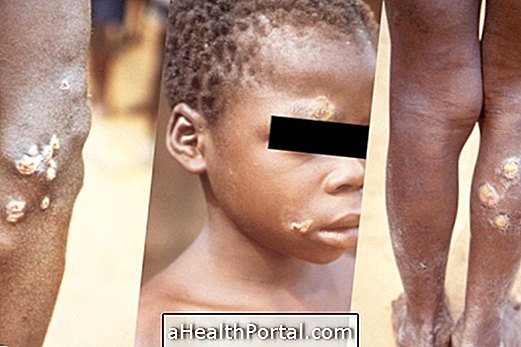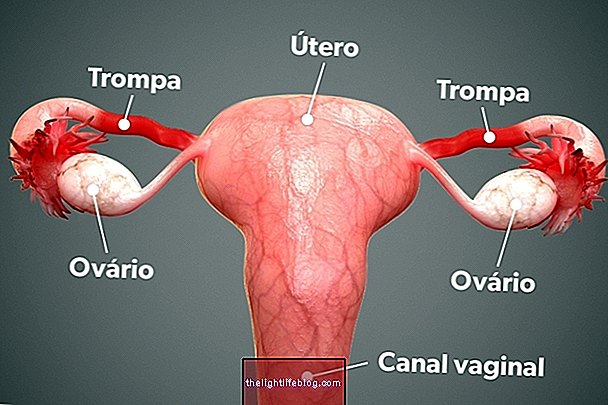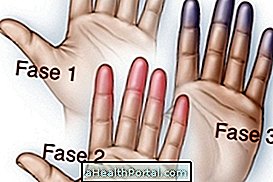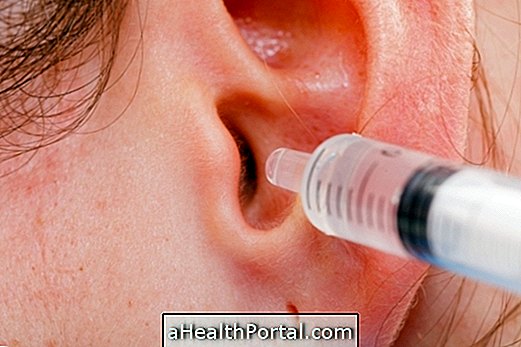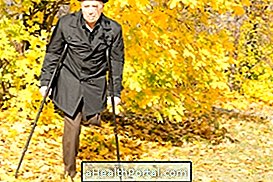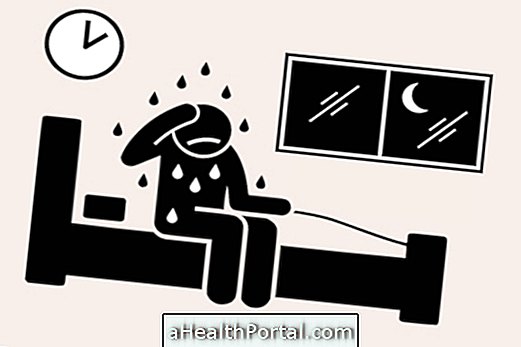Alzheimer's disease is a type of dementia syndrome, which causes degeneration and progressive brain involvement. Symptoms appear gradually, initially with memory failures, which can progress to mental confusion, apathy, mood swings and difficulties to perform daily tasks such as cooking or paying bills for example.
This disease is more common in the elderly than 60 years, however it is possible to occur in younger adults. When it affects young people, this disease is called early or familial Alzheimer's, a rare condition and only happens due to genetic and hereditary causes, and can arise after 35 years of age. Understand better what are the causes of Alzheimer's and how to diagnose it.

Symptoms of Alzheimer's in young people
The symptoms in Alzheimer's disease are progressive, that is, appear gradually. Thus, the initial signs and symptoms are subtle, often imperceptible, but they get worse over the months or years.
| Early Symptoms | Advanced Symptoms |
| Forget where you stored objects; | Mental confusion; |
| Have difficulty remembering names of people, addresses or numbers; | Speak nonsense; |
| Storing objects in unusual places; | Apathy and depression; |
| Forget important events; | Frequent falls; |
| Difficulty in guiding time and space; | Lack of coordination; |
| Difficulty performing calculations or spelling words; | Urinary and fecal incontinence; |
| Having trouble remembering activities you did often, such as cooking or sewing. | Difficulty with basic daily activities such as bathing, going to the bathroom and talking on the phone. |
It is important to emphasize that the presence of one or some of these symptoms does not confirm the presence of Alzheimer's, as they may occur in other situations, such as in people with anxiety and depression, for example, requiring consultation with a neurologist, geriatrician or general practitioner to evaluate the possibilities.
If you are suspected of having a family member with this disease, take the following test:
- 1
- 2
- 3
- 4
- 5
- 6
- 7
- 8
- 9
- 10
Alzheimer's rapid test. Take the test to find out your risk of having this disease.
Start the test

- I have a good memory, although there are small forgetfulness that does not interfere with my daily life.
- Sometimes I forget some things like the question they asked me, I forget appointments and where I left the keys.
- I often forget what I did in the kitchen, the living room, or the bedroom, and what I was doing.
- I can not remember simple and recent information as the name of who I've just met, even if I try hard.
- It's impossible to remember where I am and who the people are around me.
- I am usually able to recognize people, places and know what day it is today.
- I do not remember very well what day it is today and I have a slight difficulty in keeping dates.
- I'm not sure what month we are, but I can recognize familiar places, but I get a bit confused in new places and I can get lost.
- I do not remember exactly who my family is, where I live and I do not remember anything about my past.
- All I know is my name, but sometimes I remember the names of my children, grandchildren or other relatives
- I am fully able to solve everyday problems and deal well with personal and financial issues.
- I have some difficulty understanding some abstract concepts such as why a person can become sad, for example.
- I'm feeling a bit insecure and I'm afraid to make decisions and so I prefer that others decide for me.
- I do not feel able to solve any problem and the only decision I make is what I want to eat.
- I am not able to make any decisions and I am totally dependent on the help of other people.
- Yes, I work normally, I shop, I'm involved with the community, church, and other social groups.
- Yes, but I'm starting to have some difficulty driving but I still feel safe and I know how to handle emergency or unplanned situations.
- Yes, but I am unable to be alone in important situations and I need someone to accompany me in social engagements to be able to look like a "normal" person to others.
- No, I do not leave the house alone because I do not have the capacity and I always need help.
- No, I'm unable to leave the house alone and I'm too sick for that.
- Great. I still have chores in the house, I have hobbies and personal interests.
- I no longer feel like doing anything in the house, but if they insist, I can try to do something.
- I completely abandoned my activities, as well as more complex hobbies and interests.
- All I know is bathing alone, dressing and watching television, and I can not do any other task in the house.
- I can not do anything on my own and I need help with everything.
- I am fully capable of taking care of myself, dressing, washing, bathing and using the bathroom.
- I'm starting to have some difficulty taking care of my own personal hygiene.
- I need others to remind me that I have to go to the bathroom, but I can handle my needs on my own.
- I need help getting dressed and cleaned up, and sometimes I pee on clothes.
- I can not do anything by myself and I need someone else to take care of my personal hygiene.
- I have normal social behavior and there are no changes in my personality.
- I have minor changes in my behavior, personality and emotional control.
- My personality is changing little by little, before I was very nice and now I'm kind of grumpy.
- They say that I have changed a lot and am no longer the same person and I am already avoided by my old friends, neighbors and distant relatives.
- My behavior has changed a lot and I have become a difficult and unpleasant person.
- I have no difficulty in speaking or writing.
- I'm beginning to have some difficulty finding the right words and it takes longer to complete my reasoning.
- It's getting harder and harder to find the right words and I've had trouble naming objects, and I notice that I have less vocabulary.
- It is very difficult to communicate, I have difficulty with words, to understand what they say and I do not know how to read or write.
- I just can not communicate, I do not say much, I do not write and I do not understand what I'm told.
- Normal, I do not notice any change in my mood, interest, or motivation.
- Sometimes I become sad, nervous, anxious or depressed, but without major concerns in life.
- I get sad, nervous or anxious every day and this has become more and more frequent.
- Every day I feel sad, nervous, anxious or depressed and I have no interest or motivation to perform any task.
- Sadness, depression, anxiety and nervousness are my daily companions and I have totally lost my interest in things and I have no motivation at all.
- I have perfect attention, good concentration and great interaction with everything that is around me.
- I'm starting to have trouble paying attention to something and I'm drowsy during the day.
- I have some difficulty in attention and little concentration and so I can stare fixedly or closed eyes for a while, even without sleep.
- I spend a good part of the day sleeping, I do not pay attention to anything and when I say I say things without logic or that have no relation to the subject of the conversation.
- I can not pay attention to anything and I'm completely deconcentrated.
Which young people with more risk
Early, or familial, Alzheimer's disease occurs in less than 10% of the cases of this disease, and is due to hereditary genetic causes. So the people at highest risk are those who already have some close relative with this type of dementia, such as parents or grandparents, for example.
The children of people with hereditary Alzheimer's can do a genetic test, which may indicate if there is a risk of developing the disease, such as Apolipoprotein E genotyping, but it is an expensive genetic test available in a few neurology centers.
What to do in case of suspicion
If Alzheimer's disease is suspected in young people, it is important to consult with a general practitioner or neurologist for a clinical evaluation, physical examination, memory tests, and blood tests.
This, because, this disease is very rare in people who are not old, being much more likely that the memory alteration may be occurring for other causes, such as:
- Anxiety;
- Depression;
- Psychiatric disorders, such as bipolar disorder;
- Deficiency of vitamins such as vitamin B12;
- Infectious diseases such as advanced syphilis or HIV;
- Endocrinological diseases, such as hypothyroidism;
- Brain injury, caused by injury in accidents or after a stroke.
These changes can impair memory and cause mental confusion, being very confused with Alzheimer's disease. Thus, the treatment will be specific and according to the cause, and may require the use of antidepressants, antipsychotics or thyroid hormones, for example.
However, if early Alzheimer's disease is confirmed, treatment will be guided by the neurologist, which may indicate the use of medications such as Donepezil, Galantamine or Rivastigmine, as well as activities such as occupational therapy, physiotherapy and exercise, which are activities especially indicated in the initial phase of the disease to stimulate memory and assist in carrying out day-to-day activities. Find out what treatment options exist for Alzheimer's disease.
